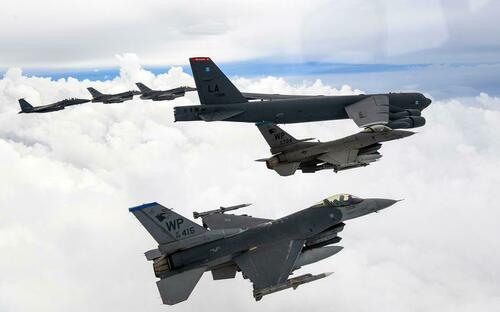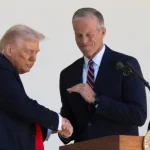
It's very likely that the government Kim Jong Un will soon ramp up its provocative missile tests once again, given that the US and South Korean militaries have just kicked off their spring drills.
The 'Freedom Shield' exercises began Monday and are scheduled to run through March 14. Importantly, these are the first annual joint Freedom Shield drills since Pyongyang pulled out of a 2018 inter-Korean military pact in November, meaning much more unpredictability and a greater chance of a direct North Korean 'response' (likely in the form of a launch, or its own provocative drills).

Reuters has cited South Korea's Joint Chiefs of Staff (JCS) to say "Freedom Shield will involve twice the number of troops from both sides compared with last year in 48 rounds of combined field training, including air assault and air strikes."
What's more is that the US-South Korea exercises are focused on preparing for a scenario where Pyongyang's nuclear arsenal would have to be hit and neutralized, including "identifying and striking" cruise missiles.
According to more from Reuters:
American strategic assets such as an aircraft carrier and bombers could participate, South Korea's Yonhap news agency said. U.S. Forces Korea said such assets will likely be deployed in line with past practices but declined to elaborate citing security protocol.
"Strategic" of course denotes nuclear forces, which again suggests the strong likelihood that Pyongyang will react fiercely.
"Large-scale military drills were halted under the administration of former President Moon Jae In, which prioritized improvement in the inter-Korean relationship," Kyodo News notes further of the significance of the timing. "But President Yoon Suk Yeol, who took office in May 2022, resumed the Freedom Shield exercise last year after a five-year hiatus."
And last week, The Wall Street Journal highlighted that North Korea's Kim has become a "bigger threat" at a moment "the world was looking elsewhere" - given the raging conflicts in Ukraine and Gaza. "Kim is playing a longer, more strategic game with a nuclear arsenal that has quickly grown since talks broke down at the February 2019 summit with former President Donald Trump in Hanoi," WSJ wrote. "That has made predicting his next steps murkier and more worrisome."
Recent tensions in January have centered on South Korea's islands which lie close to the border with the north...
VIDEO: South Korea soldiers patrol border island after North's artillery drills.
— AFP News Agency (@AFP) January 9, 2024
On the remote border island of Yeonpyeong, heavily armed soldiers locked up the beaches at dusk -- a reminder of the picturesque spot's proximity to nuclear-armed North Korea pic.twitter.com/R8PGuyiiET
The report continued: "Particularly troubling, security experts say, is how sure-footed Kim looks, despite widespread food shortages, a more confrontational South Korean administration and a U.S. that is rotating nuclear assets into the region more often."
It’s very likely that the government Kim Jong Un will soon ramp up its provocative missile tests once again, given that the US and South Korean militaries have just kicked off their spring drills.
The ‘Freedom Shield’ exercises began Monday and are scheduled to run through March 14. Importantly, these are the first annual joint Freedom Shield drills since Pyongyang pulled out of a 2018 inter-Korean military pact in November, meaning much more unpredictability and a greater chance of a direct North Korean ‘response’ (likely in the form of a launch, or its own provocative drills).

Reuters has cited South Korea’s Joint Chiefs of Staff (JCS) to say “Freedom Shield will involve twice the number of troops from both sides compared with last year in 48 rounds of combined field training, including air assault and air strikes.”
What’s more is that the US-South Korea exercises are focused on preparing for a scenario where Pyongyang’s nuclear arsenal would have to be hit and neutralized, including “identifying and striking” cruise missiles.
According to more from Reuters:
American strategic assets such as an aircraft carrier and bombers could participate, South Korea’s Yonhap news agency said. U.S. Forces Korea said such assets will likely be deployed in line with past practices but declined to elaborate citing security protocol.
“Strategic” of course denotes nuclear forces, which again suggests the strong likelihood that Pyongyang will react fiercely.
“Large-scale military drills were halted under the administration of former President Moon Jae In, which prioritized improvement in the inter-Korean relationship,” Kyodo News notes further of the significance of the timing. “But President Yoon Suk Yeol, who took office in May 2022, resumed the Freedom Shield exercise last year after a five-year hiatus.”
And last week, The Wall Street Journal highlighted that North Korea’s Kim has become a “bigger threat” at a moment “the world was looking elsewhere” – given the raging conflicts in Ukraine and Gaza. “Kim is playing a longer, more strategic game with a nuclear arsenal that has quickly grown since talks broke down at the February 2019 summit with former President Donald Trump in Hanoi,” WSJ wrote. “That has made predicting his next steps murkier and more worrisome.”
Recent tensions in January have centered on South Korea’s islands which lie close to the border with the north…
VIDEO: South Korea soldiers patrol border island after North’s artillery drills.
On the remote border island of Yeonpyeong, heavily armed soldiers locked up the beaches at dusk — a reminder of the picturesque spot’s proximity to nuclear-armed North Korea pic.twitter.com/R8PGuyiiET
— AFP News Agency (@AFP) January 9, 2024
The report continued: “Particularly troubling, security experts say, is how sure-footed Kim looks, despite widespread food shortages, a more confrontational South Korean administration and a U.S. that is rotating nuclear assets into the region more often.”
Loading…






